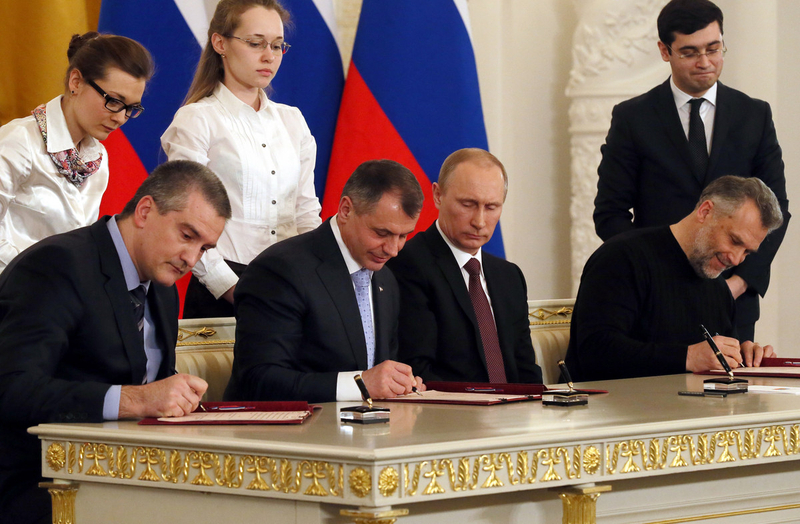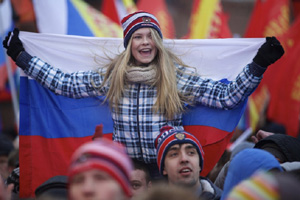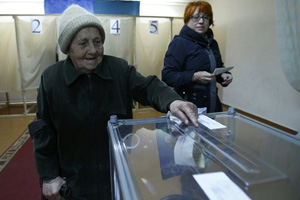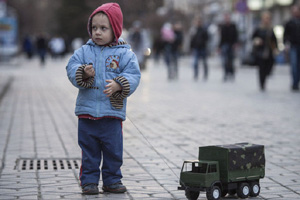 |
|
Russian President Vladimir Putin, second right, looks on as Crimean leaders, Speaker of Crimean legislature Vladimir Konstantinov, second left, Crimean Premier Sergei Aksyonov, left, and Sevastopol mayor Alexei Chalyi, right, sign a treaty for Crimea to join Russia in the Kremlin in Moscow, Tuesday, March 18, 2014. President Vladimir Putin on Tuesday signed a treaty to incorporate Crimea into Russia. [Photo/icpress.cn] |
SIMFEROPOL - Russian President Vladimir Putin on Tuesday signed a treaty with leaders of Crimea to accept the Republic of Crimea and the city of Sevastopol as part of Russian territory, defying condemnations and further sanctions by the West.
The treaty was signed with the Crimean government's delegation at a ceremony in the Kremlin following Putin's unscheduled address to both houses of the Russian parliament, or the Federal Assembly.
"Crimea is part of our common heritage and a key factor of stability in the region. This strategic territory should be under strong, stable sovereignty, which in effect can only be Russian," Putin told parliament.
Following the treaty, Western countries condemned Russia and stepped up sanctions against the country, accusing it of "attempting to annex the Ukrainian territory."
On Tuesday, U.S. President Barack Obama and German Chancellor Angela Merkel condemned Russia's moves to formally adopt Crimea.
In their telephone talk in the morning, Obama and Merkel viewed Russia's adoption of Crimea as a violation of international law and noted there would be costs, the White House said in a statement.
Crimea's decision to proclaim independence and join Russia was fully in accordance with international law and completely matched historical justice, Putin told parliament.
Meanwhile, the Russian leader blasted U.S. exceptionalism and its use of forces against sovereign states ignoring the UN and the UN Security Council.
"They brought no democracy and freedom but chaos and violence ... We were cheated repeatedly by the West," he said.
Hours before Putin signed the treaty, the United States and Europe imposed travel bans and froze assets of several Russian and Crimean officials, holding them responsible for the independence of Crimea.
Following the treaty, Washington went a step further to ban entry and freeze all U.S. assets held by Russian government officials or people with close financial ties to 11 blacklisted people, including advisors to Putin.
Threatening Russia that it would "face more serious consequences," British Prime Minister David Cameron said Tuesday he would push for tougher EU sanctions against Russia at a forthcoming European leaders' meeting.
Britain has suspended all military cooperation with Russia and halted all extant licenses for direct military export to Russia, British Foreign Secretary William Hague said Tuesday.
The official, via his personal twitter account on Monday afternoon, also said the foreign ministers of the European Union have started discussing longer term measures over the Ukraine crisis, including "the need to reduce EU dependence on Russian energy over many years to come."
Condemning Russia's move on Crimea, French President Francois Hollande on Tuesday refused to recognize the Russian treaty to annex Crimea and urged European allies to forge a strong stance against Moscow's defiance.
French Foreign Affairs Minister Laurent Fabius said early Tuesday that Paris was considering halting the assault warship deal with Russia due to the Ukraine crisis.
The minister has also reportedly said Western states agreed to suspend Russia's G8 membership.
However, according to a German government statement, German Chancellor Merkel said on Tuesday that Russia remained a member of the G8.
Speaking at a joint press conference with visiting Portuguese Prime Minister Pedro Passos Coelho, Merkel stressed that so far, only plans for the G8 summit in Sochi were being suspended.
"Apart from that, no decisions have been taken," Merkel added.
Shortly after official results of the Crimea referendum came out, UN Secretary-General Ban Ki-moon called on all parties concerned "to work for a resolution guided by the principles of the United Nations Charter."
China on Monday reiterated its position on the crisis, urging relevant parties to seek a political solution through dialogue as soon as possible.
"China is closely following the situation in Crimea and we call on all sides to exercise restraint," Chinese Foreign Ministry spokesman Hong Lei said.
On Sunday, the peninsula of Crimea held its third referendum on the issue in its history, with an overwhelming 96.77 percent of Crimeans in favor of rejoining Russia.
A recent survey jointly carried out across Russia by two Russian pollsters -- the Public Opinion Foundation and the All-Russia Public Opinion Research Center -- found that 91 percent of the respondents favor Crimea's rejoining of the Russian Federation.
The survey also found that 94 percent of the respondents believe that their country should protect the rights of ethnic Russians and other nationalities dwelling in the peninsula of Crimea.
|
 |
 Crimea holds referendum on future |
 |
|
|
|
|
|
|
|
|